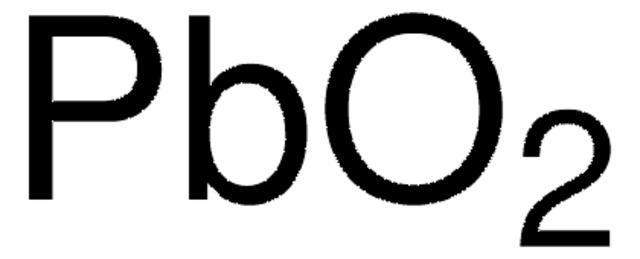467790
Lead(II) nitrate
≥99.95% trace metals basis
Synonym(s):
Lead dinitrate
About This Item
Recommended Products
Quality Level
Assay
≥99.95% trace metals basis
form
solid
reaction suitability
core: lead
impurities
<500 ppm total metallic impurities
mp
470 °C (dec.) (lit.)
anion traces
chloride (Cl-): ≤0.001%
cation traces
Ca: ≤0.005%
Cu: ≤0.002%
Fe: ≤0.001%
K: ≤0.005%
Na: ≤0.02%
SMILES string
[PbH2++].[O-][N+]([O-])=O.[O-][N+]([O-])=O
InChI
1S/2NO3.Pb/c2*2-1(3)4;/q2*-1;+2
InChI key
RLJMLMKIBZAXJO-UHFFFAOYSA-N
Looking for similar products? Visit Product Comparison Guide
Related Categories
Application
Signal Word
Danger
Hazard Statements
Precautionary Statements
Hazard Classifications
Acute Tox. 4 Inhalation - Acute Tox. 4 Oral - Aquatic Acute 1 - Aquatic Chronic 1 - Carc. 2 - Eye Dam. 1 - Repr. 1A - Skin Sens. 1B - STOT RE 1
Target Organs
Blood,Central nervous system,Immune system,Kidney
Storage Class Code
5.1B - Oxidizing hazardous materials
WGK
WGK 3
Flash Point(F)
Not applicable
Flash Point(C)
Not applicable
Personal Protective Equipment
Regulatory Listings
Regulatory Listings are mainly provided for chemical products. Only limited information can be provided here for non-chemical products. No entry means none of the components are listed. It is the user’s obligation to ensure the safe and legal use of the product.
PDSCL
Deleterious substance
PRTR
Specified Class I Designated Chemical Substances
FSL
Group 1: Oxidizing solids
Nitrates
Hazardous rank I
1st oxidizing solid
ISHL Indicated Name
Substances Subject to be Indicated Names
ISHL Notified Names
Substances Subject to be Notified Names
JAN Code
467790-VAR:
467790-250G:4548173155500
467790-50G:4548173155517
467790-BULK:
Choose from one of the most recent versions:
Already Own This Product?
Find documentation for the products that you have recently purchased in the Document Library.
Customers Also Viewed
Our team of scientists has experience in all areas of research including Life Science, Material Science, Chemical Synthesis, Chromatography, Analytical and many others.
Contact Technical Service












